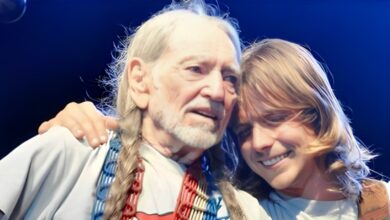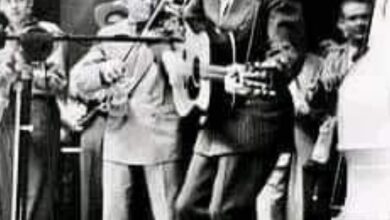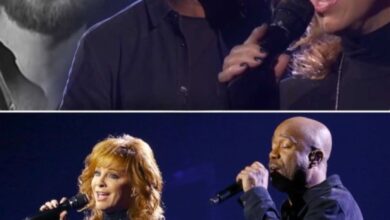His voice echoed pain; two months later he passed, still a lion
Johnny Cash’s final live performance, held on July 5, 2003, at the Carter Family Fold in Hiltons, Virginia, stands as a deeply poignant moment in music history. At the time, Cash was battling severe health issues, including significant vision loss and physical frailty, yet his determination to perform one last time was a testament to his enduring passion for music. The concert opened with his iconic introduction, “Hello, I’m Johnny Cash,” a phrase that had become synonymous with his legendary career.
Accompanied by a small band that included his son, John Carter Cash, Cash embarked on a set list that encompassed many of his most cherished songs. Classics like “Folsom Prison Blues,” “I Walk the Line,” and “Ring of Fire” resonated through the venue, each song carrying the weight of Cash’s storied career and personal experiences. His performance of Kris Kristofferson’s “Sunday Mornin’ Comin’ Down” added a reflective touch, highlighting Cash’s ability to infuse his own life into the songs he sang.
One of the most touching moments of the evening came when Cash performed “Angel Band,” a song that Emmylou Harris had sung at his wife June Carter Cash’s funeral just months earlier. This poignant tribute underscored the profound loss Cash was enduring and the enduring love he held for his late wife. Another poignant highlight was Cash’s rendition of “Understand Your Man,” a song he hadn’t performed in a quarter-century, imbuing the performance with a sense of nostalgia and introspection.
Despite the challenges posed by his health, Cash’s voice retained its emotional depth and resonant power throughout the concert. He engaged with the audience not just through his music but also through heartfelt reflections on the enduring presence of June’s spirit in his life. This intimate connection between his personal journey and his musical legacy illuminated the concert, elevating it beyond a mere performance to a profound expression of resilience and love.
Johnny Cash’s impact on American music cannot be overstated. Renowned for his distinctive baritone voice, rebellious spirit, and ability to capture the essence of human experience in his songs, Cash’s influence transcended genres and generations. From his early days at Sun Records to his later collaborations with Rick Rubin, Cash’s career spanned decades and encompassed a vast repertoire that included country, rock, gospel, and folk music. His songs, often laden with themes of redemption, justice, and faith, resonated deeply with audiences worldwide.
Beyond his musical achievements, Cash was also known for his humanitarian efforts and advocacy, particularly for prisoners’ rights. His performances at prisons, including the famous concert at Folsom Prison in 1968, exemplified his empathy and desire to connect with marginalized communities. This commitment to social issues, paired with his introspective songwriting, cemented Cash’s status as not just a musician but a cultural icon whose influence extended far beyond the stage.
In his final performance, Johnny Cash embodied the essence of his life’s work: authenticity, resilience, and a deep connection to both his music and his audience. Despite the challenges he faced in his last years, Cash’s unwavering dedication to his craft shone brightly that evening at the Carter Family Fold. His ability to confront personal grief and physical limitations with such grace and honesty left an indelible mark on all who were present and continues to resonate with fans worldwide.
Johnny Cash passed away just two months after this final performance, leaving behind a legacy that remains as vibrant and influential as ever. His songs continue to be celebrated for their honesty and raw emotion, reflecting a life lived with purpose and a commitment to truth. In the annals of music history, Johnny Cash’s final bow stands as a poignant reminder of the power of music to transcend pain and adversity, leaving an enduring legacy that continues to inspire and move audiences around the globe.





